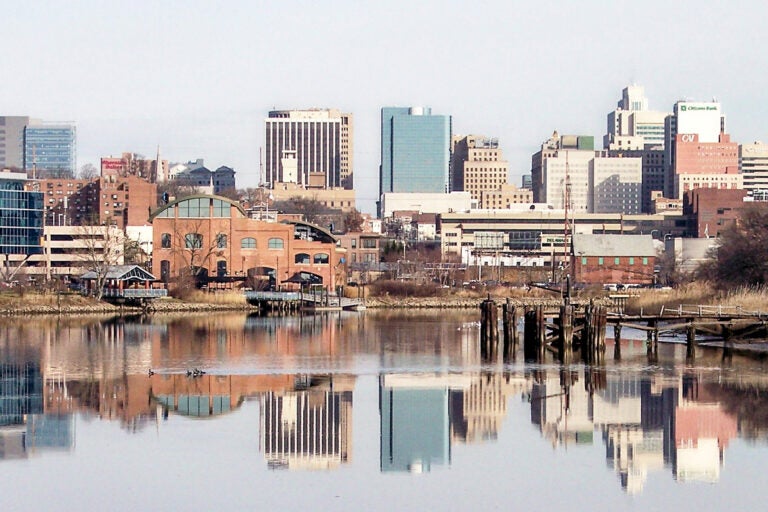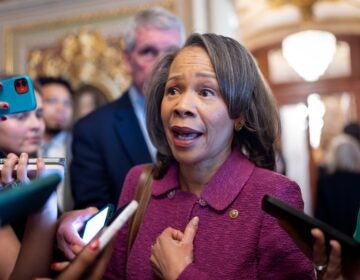Wilmington considers moratorium on water shut-offs for unpaid bills
Wilmington City Council members sparred over a plan to halt water shut-offs for residents who are overdue on their bills.

Delaware and downtown Wilmington, as seen from the Christina River, has a reputation as America's corporate capital. (Tim Kiser/Wikimedia Commons)
At the start of the pandemic last year, Wilmington stopped shutting off water to customers who were overdue on their bills. That moratorium came to an end this summer.
Since then, the city has issued 635 disconnection notices between July 1 and October 1, according to City Finance Director Brett Taylor. About half of those who are notified come in and make a payment. He said about 100 customers have had their water cut off.
“The city administration recognizes that water service is critical to the quality of life for its residents,” Taylor said, “but it has to be paid for.”
That’s not good enough for City Council Member Shané Darby.
She’s filed legislation to restart the moratorium for another six months to protect residents who are still struggling financially due in part to the pandemic.
“The community has said that this is a need,” said Darby. “The community has said this is a problem. So that is the reason why this legislation was put up.”
City Council’s Finance and Economic Development Committee held a hearing on the measure at their meeting Tuesday night.
Taylor told the group that currently there are about 11,000 residents more than 30 days behind on their water bills. That accounts for about $23 million owed to the city, he said.
“The losses in revenue result in reductions in water quality and service and could cause potential rate increases for customers,” Taylor said. “Those losses in revenue figure directly into how we operate the water utility.”
Those comments didn’t sit well with Wilmington resident Sarah Green, who testified during the public comment period.
“It sounds like you’re threatening the safety of our water and jobs based on something that’s the city’s job to provide water,” Green said. “You’re talking about numbers. You say only 105 families continue to be shut off. What if you are one of those families?”
Council Member James Spadola did not support the measure, saying Council has seen the list of who the moratorium benefited.
“There’s a lot of people, people that we all know that were on that list that are of means and have the ability to pay, but took advantage of this city, offering them an interest-free loan, essentially,” Spadola said.
He went on to say the moratorium would create an incentive for people not to pay their water bill, even those who can.
Darby rejected that idea, saying Spadola’s comments are not representative of Wilmington residents who struggle to pay their bills.
“We need to stop painting that narrative of our residents,” she said. “That tells me a lot of how you see people who live here in Wilmington and that you’re supposed to be representing, that you think all of them are lazy or trying to take advantage of the system. Now the majority of people want to pay their bills, but they cannot.”
Council President Trippi Congo said the city has received millions in federal COVID-19 relief funds and should be able to weather any kind of financial impact a six-month moratorium would cause.
“I could see if we didn’t have the money, or the money wasn’t available. I can’t see our city being in a state of financial disrepair in six months,” Congo said. “Our city is not going to go under in six months, but some of our residents might.”
The ordinance points to more than $2.7 million in federal funding for Delaware from the Low Income Household Water Assistance Program and the American Rescue Plan Act. Darby also pointed to more than $55 million coming to the city itself that could be used to fund losses in revenue from missing water payments.
Darby decided to hold off on having the committee vote on the measure until it can be amended after the city’s law department concluded that the bill would violate city code. That violation comes because it would decrease city revenue and create an unbalanced operating budget. The city’s legal expert said the ordinance would have to be accompanied by another ordinance to offset that revenue decrease in some way.
“I knew coming in that I was going to hold this, but I wanted the community to be heard,” Darby said. “We’re going to go back to the table because the money is there, the funding is there, so the city can sit here and tell us all they want that there is no money for this. There is money to cover someone for six months and have for us to be able to address other issues of the water.”
Council’s final meeting of the year will be held on Dec. 9. The Finance and Economic Development Committee will reconvene on Jan. 3 before Council’s first meeting of 2022 on Jan. 6.

Saturdays just got more interesting.
WHYY is your source for fact-based, in-depth journalism and information. As a nonprofit organization, we rely on financial support from readers like you. Please give today.







